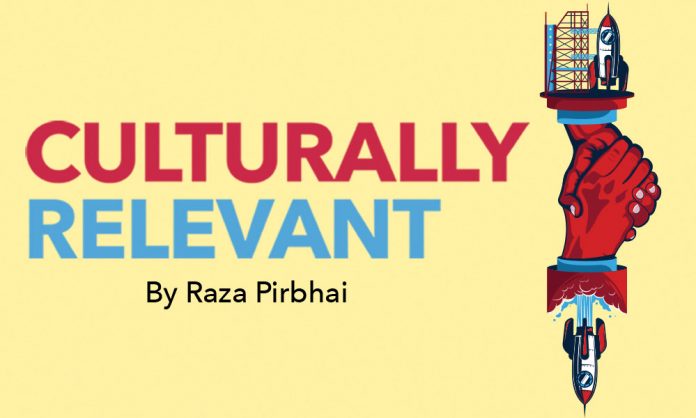Raza Pirbhai, CEO- KFC talks about the role creative agencies play in brand building keeping cultural implications at the center.
 Synergyzer: Congratulations on launching such a game-changing corporate campaign for KFC.
Synergyzer: Congratulations on launching such a game-changing corporate campaign for KFC.
Raza Pirbhai: I would say that Synergy Dentsu, our current advertising agency, has done a fabulous job with the communication. They figured out how to create a locally relatable, young, fun-loving brand personality for KFC; while working within a local framework, using local insights, and keeping the campaign culturally relevant.
Until now, we had not really given KFC a personality in Pakistan, yet our corporate campaign has gotten it just right. It is very youthful, it has that thrill, and it speaks to the right audience. I would say no one, at least in the food retail space, has come up with such an absolutely distinctive idea. Our new corporate campaign has entirely taken the brand to another level.
“KFC in the USA or Australia may produce very bold ads but since the Pakistani society is family-centric, we have got to stay within the Pakistani culture and the society’s religious limitations”.
Synergyzer: What role do you see of advertising agencies in building KFC as a brand?
Raza: I believe that since KFC is a global brand, our advertising agencies – Orient McCann Pakistan in the past and Synergy Dentsu at present – have helped us majorly in creating a cultural link with the Pakistani market. Both have helped us understand local insights on which to create KFC’s own space decipher our tonality, make us more culturally relevant, whilst maintaining our distinctiveness. Yet at the same time in all of this, we all ensured that KFC does not cross any lines.
Synergyzer: A number of industry specialists have pointed out that several times, pitches are carried out by brands to build their idea-bank versus evaluating which advertising agencies to take onboard. What is your opinion on this?
Raza: I can’t speak for other brands or the industry at large, but at KFC Pakistan, our usual practice is that we do a review with the current advertising agency and if it has not delivered up to the mark, we look for another agency. That’s a fair chance that should be given to any company. This way, we don’t call for a pitch every year; rather we only do so when we feel it’s necessary.
As for using pitches to build an idea bank, this is a question of ethics. A genuine, ethical company with the right practices in place would never do that. It would call for pitches to qualify and get the right creative communications partner onboard.
Advertising agencies are regarded as extended partners and custodians for any brand, and their understanding is strengthened the longer they work on the brand. Then why is it that brands look for changing agencies?
Raza: Because longevity has its upsides and downsides. The upside is that when one ad agency works with a brand for a long time, it comes to understand the brand’s essence deeply; what it looks like, how it’s positioned, its exact target group, and the cultural insights most relevant to it – everything about the brand is right at the advertising agency’s fingertips.
The downside is that in a long-term association since everything is at the agency’s fingertips, they no longer want to go deep into insights and challenges. Mundanity creeps in, and communications become repetitive. If an ad agency that has been associated with the brand on a long-term basis, very creatively takes the brand one notch higher every year, no brand would look for a new partner. But when brands start to get bored with the same kind of content, they go out looking for fresh ideas.
That’s why more experimental or innovative brands will look for different agencies, to get new ideas. New creative partners feel challenged, and they want to prove themselves, which works in the brand’s favor.
“If an ad agency that has been associated with the brand on a long-term basis, very creatively takes the brand one notch higher every year, no brand would look for a new creative partner”.
Are there any global guidelines that KFC follows in terms of advertising?
Raza: We have a pretty broadly calibrated global framework. It comprises of KFC’s brand identity and visual assets that are instantly, internationally recognized. These global parameters regulate the brand essence and the target group in which we operate, ensuring that the personality of the brand does not change, no matter the market KFC serves. Yet, we are not restricted on the creative front. Rather KFC as a brand encourages its regional teams to think global, yet act local, which is really helpful since this way we can put in KFC’s persona and create localized and culturally relevant campaigns. So there’s a lot of flexibility and we have the space to adapt.
KFC Pakistan has always produced original ads, never adaptations. Are there any challenges that you face in terms of streamlining global guidelines with cultural norms?
Raza: Exactly, because that’s what our global framework outlines. Again, that’s where our advertising agencies help, by creating campaigns relevant to the local culture.
For instance, KFC in the USA or Australia may produce very bold ads but since the Pakistani society is family-centric, we have got to stay within the Pakistani culture and the society’s religious limitations. At the same time we need to have a grip on what is relevant to the audience whom we, as a brand, want to speak to. That’s where the advertising agency comes in, to helps us adhere to societal norms and target market requirements.

